Chinese corporate bond defaults hit a record high of RMB116 billion ($18 billion) in the first half of 2021 and are expected to rise in the months to come. Defaults are also getting bigger, with defaulters having RMB8.7 billion onshore bonds outstanding on average, according to Fitch. This is 1.6 times the size of defaults in 2020 and three times that of 2017.
While these are worrying signals for investors in the Chinese bond market, there are also signs that regulations and infrastructure for market-oriented debt resolutions are developing, albeit slowly.
From property developer China Evergrande to China Huarong Asset Management, bond defaults, especially of state-owned enterprises, have caused jitters in the global market. Zombie companies and insolvent local government financial vehicles are common default candidates but the real estate sector could be hard hit.
All eyes are on Evergrande, which is sitting on a $300 billion mountain of liabilities, and whether the Chinese government will decide to bail out the debt-laden company. As China’s state-owned banks are the biggest creditors of the company, they rank high on the liability waterfall and will be prioritised before private investors, including bondholders.
See also: China's cryptocurrency regulations will propel similar regulations globally
While the practice of government bailouts may have been frequent in the past, China is shifting gears towards more tolerance for defaults of unfit firms in an effort to push for market opening and discipline. State-owned enterprises have long been favoured by the government and benefited from implicit debt guarantees. By drawing a line between what is systemic and what is not, the central government is injecting more credit risk into the financial system and pushing investors to think about their risk appetite, rather than relying on the government to bail out distressed borrowers. It is also sending a signal to companies that they can no longer rely on the government to help them out.
The momentous task the Chinese government now faces is to ensure that defaults happen in an orderly fashion in its de-risking campaign. A number of initiatives are being taken to clean up the bond market.
See also: China's bitcoin crackdown is not its final act
The primary focus is on cleaning up the rating agency sector. In August, five central government bodies, including the China Securities Regulatory Commission and the China Banking and Insurance Regulatory Commission, issued rules for rating companies detailing standards for disclosures, corporate governance, and business operations. They are required to be stringent about rating scores based on the probability of defaults and reduce the proportion of high rated bonds, a practice that has been common for domestic rating agencies that want to attract potential clients.
Another priority is to develop the legal infrastructure for courts to deal with defaulters. Court restructurings of defaulters are beginning to take shape as the market starts to accept court-led workouts. However, legal precedents for bankruptcy proceedings are still new. For offshore bondholders, the process is slow and arduous. What will help in the future is streamlining of documentation, whether it is for transfer or liquidation, to ensure that investors can do repatriations. It remains a challenge for offshore bondholders to find recourse when they are structurally subordinated to onshore claimants and face challenges such as delaying tactics and lack of transparency in the legal process.
See also: Primer on China's new export control law
What is evident is that the Chinese government is steadfast in its goal to bring its bond market and related regulatory and legal infrastructure to international norms, but the process to get to the final goal will take time and plenty of patience from investors.

